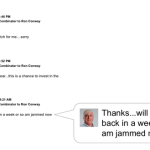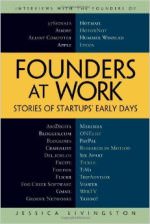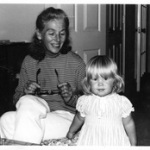Jessica Livingston born
0 0 reuben reuben2014-10-18 09:53:102014-10-18 09:57:48Jessica Livingston bornGraham, Livingston dating
Graham and Livingston start dating. Livingston:
We met at a party in Cambridge Massachusetts randomly. It’s kind of a funny story. I actually went, he was co-hosting the party with a friend of his, I was with a guy I was taking a class at Harvard Extension School with. I wasn’t gonna go, it was a Saturday night and I didn’t have a friend to go with me so I wasn’t gonna go but I went anyway. I arrived on the doorstep, and I said “ Oh, I’m Jessica, I’m friends with Murat and I’m here for the party” and he said “Murat? Didn’t you hear? He moved to Arkansas last week to join the Wes Clark campaign. He’s not here tonight.” So, I said, “Oh my God, I’m not gonna know anyone.” I did not know one person at this party and I went in and had a great time and met, you know Paul, and Trevor, our other co-founder and just hit it off. And then Paul and I started dating and I started meeting more people who are involved in start-ups.
Reached out to Conway
 Livingston says Y Combinator reached out to Conway in its early stages, but wasn’t able to communicate to him what the firm did.
Livingston says Y Combinator reached out to Conway in its early stages, but wasn’t able to communicate to him what the firm did.
He said, “Is this in Boston? I stick mainly local.” I replied, “No, we’re in Mountain View and we’d love for you to come to Demo Day.” He said, “Is this a chance to invest in the incubator?” I replied, “No, we don’t want you to invest in us. It’s a chance to invest in the individual startups.” Then he told us he’d circle back, since he was jammed. We got the “am jammed now” from Ronco—it was so embarrassing.
She says Conway did end up coming to Demo Day in 2006, and returned to talk at the next year’s winter event.
Wozniak interview
Livingston interviews Wozniak for Founders At Work about starting Apple. His advice for people considering starting a startup:
First of all, try to have the highest of ethics and to be open and truthful about things, not hiding. If you have to hide something for company reasons, at least explain what you’re doing. Don’t mislead people. Know in your heart that you are a good person with good goals because that will carry over to your own self-confidence and your belief in your engineering abilities. Always seek excellence: make your product better than the average person would.
Founders At Work
 Livingston publishes the collection of interviews with 32 startup founders. She says she has always liked writing, and wanted to write something that ‘gets to the heart’ of the experiences that startup founders had.
Livingston publishes the collection of interviews with 32 startup founders. She says she has always liked writing, and wanted to write something that ‘gets to the heart’ of the experiences that startup founders had.
I hear these stories that they talk about, or the other people they knew who had done startups, that seem so crazy to me. Stories about how they sort of lied, not lied to investors, but pretended to look much more advanced that they were. When really they had one computer and they stole people’s monitors and put them on the desk so it would look like they had more. This was crazy, no one knows about this. And I was working at this tech, this emerging growth investment bank and I thought I should kind of know about this stuff….I sort of based on the concept of Paris reviews writers, it worked and talked about how did you it.
Authors@Google interview
Livingston says she wrote Founders At Work as there was a lack of information about the early stages of a company.
I thought, the bankers and analysts at my [finance] company don’t really understand what happens at companies until they go public…the truth is, noone really knows what happens in the first few years of startups except the founders and the people who work there
She did 32 interviews over the course of two years:
I tried to collect this really interesting fund of experience for…people who are thinking of starting a startup, or want to go and work for one, or are just interested
Graham, Livingston marry
0 0 reuben reuben2014-10-18 09:53:152014-10-18 09:53:15Graham, Livingston marryYC Founders at Work: AirBnB
Livingston interviews Chesky and Gebbia from AirBnB:
We had a month of runway left, we had very little money in the bank, and had to figure out how to make the next rent check….There was a design conference coming to San Francisco. And here we were thinking we need to make money and we need to meet people. So we put the two together and decided why not make a little designer bed and breakfast for the design conference? We noticed all the hotels were sold out… and that was the lightbulb for us. We pulled out a coupe of Airbeds and we had the original idea: Airbed and Breakfast! We weren’t trying to start a business. We were trying to solve our own problem.
YC Founders at Work: Dropbox
Livingston interviews Houston, founder of Dropbox. On finding cofounder, Arash Ferdowsi:
That was definitely one of the bigger struggles getting started– having this idea and not having a co-founder. And Paul [Graham] and everybody told me over and over again that this was a necessary condition of joining Y Combinator. I was networking around and letting people know about DropBox and seeing what they though and met Kyle Vogt, a founder of Justin.tv. Kyle had dropped out of school to join Justin.tv and it turned out that he and Arash were both undergrads at MIT, and both from Kansas. The same kind of cabin fever that I had being in Cambridge and watching all my friends move out to Silicon Valley I think Arash was feeling too. So, I put up the screencasts, three or four minute video, about Dropbox and Arash emailed me after that, because Kyle let him know I was looking for a co-founder. We met up at the coffee house at MIT and everything went from there.
YC Founders at Work: Reddit
Livingston interviews Ohanian about the early days of Reddit. Livingston asks about the “Chicken and egg” problem of building a community with no initial users:
This is one that I have no hesitation in saying, but it always stirs up a lot of controversy. Steve [Huffman] built a really simple system for admins, that is Steve and me, so that when we submitted a link also let us type in a user name. It let us easily and efficiently create lots of fake users. And we were able to browbeat a few of our friends to build up comments. But the rest of our friends and family could not be begged or bribed enough to do it really consistently. The only option we had to resort to was to fake it. But we didn’t have to do it for too long because Paul [Graham] did us a big favor by [profiling us] us in an early essay.
It was at some point about three or four weeks into it that neither Steve or I had to submit or vote on anything, and the site just worked…We could spend the day just lurking on Reddit, that is just using it like the vast majority of people do and not actually generate content. That was huge. That was when we realized, maybe we haven’t wasted this summer and we had a legitimate community.
YC Founders at Work: Posterous
Livingston interviews Tan and Agarwal, founders of Posterous. Asked about how close their original version was to the current version of the site.
It’s actually pretty close. Sergei and I have always been bloggers. The two of us since high school, have always had a personal website that has our thoughts and photos…We were using all these tools. I was using Blogger and Xanga, and we were really frustrated with the tools we were using.. And they were really text based. The idea was that blogging meant having to type out a whole lot of text. Nobody wants to type out text, nobody wants to read it — it’s really boring. We wanted to share photos. Now how do you put photos on the web? Now have to use Flickr, and now I want to share videos — I have to use YouTube. And there really wasn’t a solution to get rich media onto the web…And between all of that email was the unifying protocol that made a lot of sense…The initial prototype was: I want to send an email and I want it to appear on my blog. The first 20 lines of code written were to post from email.
GigaOM interview
Livinston talks to GigaOm about what qualities Y Combinator partners look for in founders who apply.
First and foremost, the cofounder relationship is extremely important… Second, have the founders built something before?… Another quality I think is important is kind of being flexible-minded, or open-minded…. I always say the most important quality in any founder is being determined, and that is probably the toughest quality to judge in a 10 minute interview.
Startup School 2012
Livingston talks about co-founders leaving and other issues that can de-rail a startup:
It’s a red flag when you find yourself wondering if you can trust your co-founder
Investors tend to have a herd mentality, which she says is a Catch-22 situation, but once it is overcome it can work in the company’s favor:
If they like you, others like you. If noone likes you until others do, what happens when you talk to the first one? Noone likes you. You’re really starting off in a hole and you have to work your way out of it.
New York Times feature
The newspaper profiles the firm’s Demo Day, speaking with Graham, Altman, and Livingston about the company’s strategy for picking startups to support. Graham:
Imagine an assembly line where Facebooks and Googles come along every few years. You can either pick that cookie off the assembly line or not. If you pick it off, it’s market price, which varies. But if you don’t pick it off, you’re out of the game.
Startup Grind 2013
Livingston says being able to show revenue growth, tie-ups with larger partners, and a solid product are all ways founders can get investors’ attention. But they must have a long-term goal:
Communicate what the grand vision is down the road….that’s very important to investors
Conway at Startup School 2013
Livingston interviews Conway about his investments, and what he thinks is the future of social apps. Conway:
I don’t know because I’m not a founder, but I’m sure people out there [in the audience] have ideas on what is the next social app, because social apps are changing the way people communicate
Startup Grind 2014
Livingston is interviewed onstage about Y Combinator companies, approaching Ron Conway, and whether starting a startup has become a trend:
I think it’s steadily increased. There was definitely a spike when Social Network came out [and] Facebook went public…when we started in 2005 it was not a mainstream thing to do.
She says Y Combinator is getting applicants that are further along, and different founder demographics like older people and family teams:
There are definitely people applying to Y Combinator that are much farther along than they used to be … now it’s people doing Series A at the same time as coming to us
On how non-profits can become more efficient:
We’re hoping that the non-profits can learn that if you apply some of the techniques that the startups do like move fast, launch early, listen to your users…some of those things can make the non-profits better
Female Founders Conference 2014
Y Combinator holds its first ever Female Founders Conference at the Computer History Museum in Mountain View, California. In her opening remarks, Livingston says that the sold-out gathering is “the most over-subscribed event” in their history.
I wouldn’t be surprised if in five years, we feel like 2014 was the tipping point for female founders.
She shares some basic advice that she likes to share with all start-up founders: the importance of having determination, empathy, living frugally at the start, and focus. She then goes on to spell out some key pieces of advice for female founders in particular: Having children and starting a business is hard — but possible; It’s OK to be the ‘quiet cofounder’; Learn how to code — and don’t be afraid to start up with a spouse or personal partner.
Don’t feel like there’s anything weird about starting a startup with your significant other. We have significant evidence it works.
Women 2.0 interview
Livingston talks at the conference about whether founders need an accelerator:
What I would probably do if it were me…if you were a seasoned entrepreneur and have done 10 startups and have heaps of investor connections, maybe you don’t need an incubator
She says successful founders have still come back to Y Combinator:
[…] They know this three months is going to be super-intense and it almost forces them to be productive and get stuff done, so we still add value.
Gives advice on marketing for startups
0 CommentsLivingston says startups should avoid broad marketing tactics and try to appeal to a narrow investor base:
[…] you should be talking to a small number of users who are seriously interested in what you’re making, not a broad audience who are on the whole indifferent.

